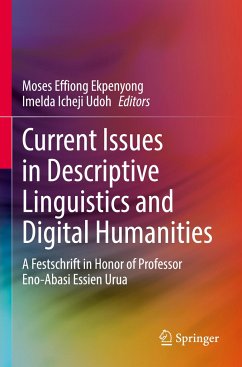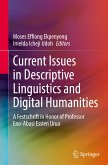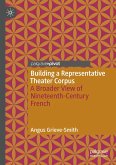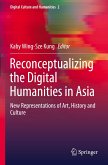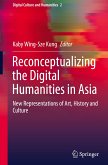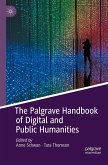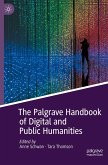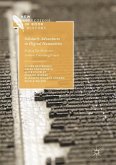Current Issues in Descriptive Linguistics and Digital Humanities
A Festschrift in Honor of Professor Eno-Abasi Essien Urua
Herausgegeben:Ekpenyong, Moses Effiong; Udoh, Imelda Icheji
Current Issues in Descriptive Linguistics and Digital Humanities
A Festschrift in Honor of Professor Eno-Abasi Essien Urua
Herausgegeben:Ekpenyong, Moses Effiong; Udoh, Imelda Icheji
- Broschiertes Buch
- Merkliste
- Auf die Merkliste
- Bewerten Bewerten
- Teilen
- Produkt teilen
- Produkterinnerung
- Produkterinnerung
This book is a convergence of heterogeneous insights (from languages and literature, history, music, media and communications, computer science and information studies) which previously went their separate ways; now unified under a single framework for the purpose of preserving a unique heritage, the language. In a growing society like ours, description and documentation of human and scientific evidence/resources are improving. However, these resources have enjoyed cost-effective solutions for Western languages but are yet to flourish for African tone languages. By situating discussions around…mehr
Andere Kunden interessierten sich auch für
![Current Issues in Descriptive Linguistics and Digital Humanities Current Issues in Descriptive Linguistics and Digital Humanities]() Current Issues in Descriptive Linguistics and Digital Humanities161,99 €
Current Issues in Descriptive Linguistics and Digital Humanities161,99 €![Building a Representative Theater Corpus Building a Representative Theater Corpus]() Angus Grieve-SmithBuilding a Representative Theater Corpus37,99 €
Angus Grieve-SmithBuilding a Representative Theater Corpus37,99 €![Reconceptualizing the Digital Humanities in Asia Reconceptualizing the Digital Humanities in Asia]() Reconceptualizing the Digital Humanities in Asia110,99 €
Reconceptualizing the Digital Humanities in Asia110,99 €![Reconceptualizing the Digital Humanities in Asia Reconceptualizing the Digital Humanities in Asia]() Reconceptualizing the Digital Humanities in Asia110,99 €
Reconceptualizing the Digital Humanities in Asia110,99 €![The Palgrave Handbook of Digital and Public Humanities The Palgrave Handbook of Digital and Public Humanities]() The Palgrave Handbook of Digital and Public Humanities168,99 €
The Palgrave Handbook of Digital and Public Humanities168,99 €![The Palgrave Handbook of Digital and Public Humanities The Palgrave Handbook of Digital and Public Humanities]() The Palgrave Handbook of Digital and Public Humanities170,99 €
The Palgrave Handbook of Digital and Public Humanities170,99 €![Scholarly Adventures in Digital Humanities Scholarly Adventures in Digital Humanities]() Claire BattershillScholarly Adventures in Digital Humanities59,99 €
Claire BattershillScholarly Adventures in Digital Humanities59,99 €-
-
-
This book is a convergence of heterogeneous insights (from languages and literature, history, music, media and communications, computer science and information studies) which previously went their separate ways; now unified under a single framework for the purpose of preserving a unique heritage, the language. In a growing society like ours, description and documentation of human and scientific evidence/resources are improving. However, these resources have enjoyed cost-effective solutions for Western languages but are yet to flourish for African tone languages. By situating discussions around a universe of discourse, sufficient to engender cross-border interactions within the African context, this book shall break a dichotomy of challenges on adaptive processes required to unify resources to assist the development of modern solutions for the African domain.
Produktdetails
- Produktdetails
- Verlag: Springer / Springer Nature Singapore / Springer, Berlin
- Artikelnr. des Verlages: 978-981-19-2934-2
- 1st ed. 2022
- Seitenzahl: 744
- Erscheinungstermin: 2. Dezember 2023
- Englisch
- Abmessung: 235mm x 155mm x 40mm
- Gewicht: 1107g
- ISBN-13: 9789811929342
- ISBN-10: 9811929343
- Artikelnr.: 69302846
- Herstellerkennzeichnung Die Herstellerinformationen sind derzeit nicht verfügbar.
- Verlag: Springer / Springer Nature Singapore / Springer, Berlin
- Artikelnr. des Verlages: 978-981-19-2934-2
- 1st ed. 2022
- Seitenzahl: 744
- Erscheinungstermin: 2. Dezember 2023
- Englisch
- Abmessung: 235mm x 155mm x 40mm
- Gewicht: 1107g
- ISBN-13: 9789811929342
- ISBN-10: 9811929343
- Artikelnr.: 69302846
- Herstellerkennzeichnung Die Herstellerinformationen sind derzeit nicht verfügbar.
Moses Ekpenyong is an Associate Professor of Computer Science and current Director, Centre for Research and Development, University of Uyo. His research covers a broad spectrum of Computational Intelligent methods that ignite evidence-based solutions, through the application of Artificial Intelligence (AI) and Data Science in the STEM, Humanities and Medical disciplines. Within the STEM disciplines, he applies machine learning techniques in areas of development challenge. So far, Dr. Ekpenyong has explored areas of critical and unmet needs in the fields of Communications, Oil and Gas, and more; mainly focusing on AI-driven tools/models' development for scientific discoveries and knowledge-based systems. In the humanities, he has used Speech Technology to build adaptive, open-source, and data-driven tools/models for African tone languages and cooperating with colleagues in a Nigerian language Project, to actualize a spatial databank for Nigerian languages using GIS technology. His collaboration in the field of Medicine applies Bioinformatics and Biological Computing to develop hybrid frameworks/systems for global infectious disease surveillance. Dr. Ekpenyong has served as a reviewer to numerous national and international journals and has over 100 publications to his credit. He is a member of several professional bodies and has held key positions within the University system. Imelda Icheji Udoh is a Professor of Linguistics and Nigerian Languages in the University of Uyo. She has done extensive research in Descriptive and Documentary Linguistics on languages of the Upper and Lower Cross River spoken in Akwa Ibom and Cross River States of Nigeria, through several projects like the Electronic Metastructure for Endangered Language Data (E-MELD) housed in Michigan State University, of which she is an Advisor. She is the coordinator of the Nigerian Languages Project, which is building up a database on Nigerian languages, as well as mapping them using GIS Technology. Professor Udoh is on the editorial board of national and international journals, and a reviewer to several of these journals, with over 70 publications. She has passion for the minority languages, especially Leggbo, and other Upper Cross languages of the Cross River State, Nigeria; and has produced several books on core areas of Language Description and Documentation. Professor Udoh has also served as a co-instructor on "Documentation of Orature" at the Institute of Collaborative Research (CoLang), Alaska, sponsored by NSF, ELF, LSA. She is a DAAD alumnus and belongs to several professional bodies including the Nigerian Academy of Letters.
Language, Proverbs, Power and Male Chauvinism in Anaang Society.- A Morphological Description of Proverbial Ígálà Personal Names.- Linguistic Colonialism and Its Implications on Indigenous Languages in Nigeria.- Americanization Of English In Nigerian Broadcasting: A Sociophonetic Insight into Traditional News Broadcast Vs. Entertainment News Broadcast.- The Concept of Listening.- Syntax of Agreement in Ekid.- Religious Rhetoric and Church Development in Rural Nigeria.- A Contrastive Analysis of The Verbal Group Structures of English And Urhobo.- Inherent Complement Verbs in Ibibio.- A Phonological Description of Ibibio Individual Name.- Significance of The Ibibio Indigenous Songs in The Ibibio Cultural Heritage.- Bridging Language Gap, Promoting Deaf Literacy in Nigeria Through Indigenous Sign Languages.- Syntactic Analysis of Non-Basic Constructions In Ék d Ibibio Speech Rhythm: Two Phonetic Paradigms.- An Epigraphy of Igbo Inscriptions on Tricycles in Aba.- The Nativisation Of English Language in Chimamanda Adichie's Collection of Short Stories, The Thing Around Your Neck.- Level-Ordered Morphology in B t Simple Nouns.- A Morpho-Phonological Investigation of The Derivation of Iz N Numerals.- Oral Tradition and Literature: A Conceptual Analysis of Itu Mbon Uso Folktales.- Requesting Strategies in Nigerian And British English: A Corpus-Based Approach.- Polar Interrogative Strategies in Obolo.- Teachers' Motivational Impacts on Second Language (L2) Learners' Goal Attainment: The Eno-Abasi Urua Model.- The Language Factor in Information Dissemination for Development.- Language, Culture, and Identity: The Nigerian Situation Communication for Social Mobilization in Selected Mamser Campaign Speeches.- Body Parts as Grammatical Markers in Fulfulde: The Case of Prepositions.
Language, Proverbs, Power and Male Chauvinism in Anaang Society.- A Morphological Description of Proverbial Ígálà Personal Names.- Linguistic Colonialism and Its Implications on Indigenous Languages in Nigeria.- Americanization Of English In Nigerian Broadcasting: A Sociophonetic Insight into Traditional News Broadcast Vs. Entertainment News Broadcast.- The Concept of Listening.- Syntax of Agreement in Ekid.- Religious Rhetoric and Church Development in Rural Nigeria.- A Contrastive Analysis of The Verbal Group Structures of English And Urhobo.- Inherent Complement Verbs in Ibibio.- A Phonological Description of Ibibio Individual Name.- Significance of The Ibibio Indigenous Songs in The Ibibio Cultural Heritage.- Bridging Language Gap, Promoting Deaf Literacy in Nigeria Through Indigenous Sign Languages.- Syntactic Analysis of Non-Basic Constructions In Ék d Ibibio Speech Rhythm: Two Phonetic Paradigms.- An Epigraphy of Igbo Inscriptions on Tricycles in Aba.- The Nativisation Of English Language in Chimamanda Adichie's Collection of Short Stories, The Thing Around Your Neck.- Level-Ordered Morphology in B t Simple Nouns.- A Morpho-Phonological Investigation of The Derivation of Iz N Numerals.- Oral Tradition and Literature: A Conceptual Analysis of Itu Mbon Uso Folktales.- Requesting Strategies in Nigerian And British English: A Corpus-Based Approach.- Polar Interrogative Strategies in Obolo.- Teachers' Motivational Impacts on Second Language (L2) Learners' Goal Attainment: The Eno-Abasi Urua Model.- The Language Factor in Information Dissemination for Development.- Language, Culture, and Identity: The Nigerian Situation Communication for Social Mobilization in Selected Mamser Campaign Speeches.- Body Parts as Grammatical Markers in Fulfulde: The Case of Prepositions.

